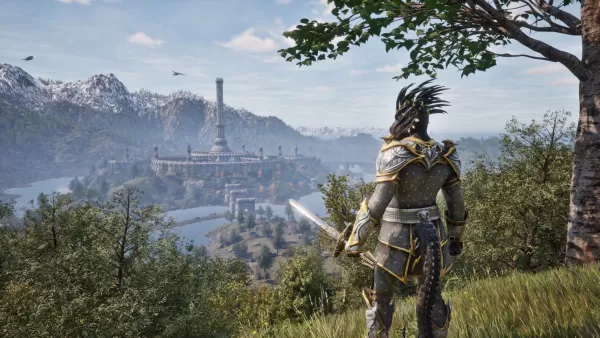By Azura, by Azura, by Azura – the rumors were true. Yesterday, Bethesda set the internet on fire by finally unveiling Virtuos’ remaster of The Elder Scrolls IV: Oblivion. In a surprise 'Elder Scrolls Direct,' the remaster was shadow-dropped, instantly attracting hundreds of thousands of concurrent players. This global celebration marks a pivotal moment for Bethesda Game Studios, which has been grappling with challenges in recent years. From managing the fallout of Fallout 76’s troubled launch to the lukewarm reception of Starfield, fans have questioned if Bethesda has lost its touch. With fierce competition from RPGs like Larian Studios’ Baldur’s Gate 3 and Obsidian’s The Outer Worlds, both acclaimed as spiritual successors to Elder Scrolls and Fallout, Bethesda's future titles like Elder Scrolls 6 and Fallout 5 are years away. Yet, this re-release of Oblivion could be a significant step in the right direction – though not in the way one might expect.
At its peak, Bethesda Game Studios was the epitome of RPG excellence. In 2020, Microsoft’s leaked FTC documents revealed that Fallout 4 had sold 25 million units to date, with over 5 million units sold in its first week alone according to VGChartz. By 2023, Todd Howard announced that Skyrim had surpassed 60 million sales, bolstered by its numerous re-releases. In contrast, Starfield has only managed about three million units sold a year and a half after launch. Despite the boost from Game Pass subscribers and the absence of a PlayStation version, this performance is likely a disappointment for Bethesda. Even Starfield's dedicated fanbase has expressed dissatisfaction with its first expansion, Shattered Space.
This situation presents a significant challenge for the developer. With Elder Scrolls 6 still "years away" and Fallout 5 merely a whisper in the studio’s corridors, how can Bethesda recapture the magic that once defined it? The answer may lie in revisiting its storied past.
Rumors of the Elder Scrolls IV: Oblivion remaster started circulating in September 2023, following leaks from Microsoft documents that hinted at several unannounced Bethesda projects, including this remaster of the 2006 classic. The buzz continued until January 2025, when a former Virtuos employee shared more details, sparking debate among Elder Scrolls fans. The speculation reached a fever pitch last week when Bethesda officially unveiled the remaster, resulting in over 6.4 million Google searches for ‘The Elder Scrolls IV: Oblivion’ and a 713% increase in searches in the last week alone. At its peak, the reveal livestream attracted over half a million viewers. Despite the leaks, or perhaps because of them, over 600,000 people tuned in to see the 19-year-old game re-revealed. The intense demand for the remaster led to crashes on discount game key websites like CDKeys and slowed down Fanatical and Green Man Gaming. As of yesterday, Steam reported 125,000 concurrent players, with the game topping the charts as the #1 best seller. The enthusiasm Bethesda fans have for Oblivion is as intense as the flames that spill from the Oblivion gates.
The message from players is clear: if you (re)build it, they will come. What better way to keep fans engaged during these long development periods than to invite them back to the mysterious isles of Morrowind or the post-apocalyptic landscapes of the East Coast? From a commercial perspective, it's a smart move. While Bethesda's main development team focuses on new, long-term projects, trusted partners like Virtuos can utilize existing blueprints to create remasters in shorter time frames. These remasters appeal to established audiences and introduce new generations to the rich worlds of Tamriel and the Fallout series.
Bethesda has successfully leveraged its catalogue in the past. During the first season of the Fallout TV show on Prime Video, Fallout 4 was discounted by up to 75%, accompanied by a next-gen update that included homages from the show. As a result, Fallout 4 sales surged over 7,500% in Europe despite being nearly a decade old.
 Oblivion Remastered offers a visit to the past that looks like the future. Image credit: Bethesda / Virtuos
Oblivion Remastered offers a visit to the past that looks like the future. Image credit: Bethesda / Virtuos
Looking back at Microsoft’s leaked Bethesda roadmap, a Fallout 3 remaster was listed to follow Oblivion two years later. Although the timelines have shifted – Oblivion was originally slated for fiscal year 2022 – if these gaps remain consistent, a Fallout 3 remake could be expected in 2026, coinciding with the second season of the Fallout TV show. Given the show's shift to New Vegas, it's possible that Bethesda might surprise fans with a New Vegas remake, especially considering the synergy between the first season and Fallout 4. The shadow-drop of Oblivion suggests that a New Vegas Remastered trailer could be waiting at the end of Fallout Season 2's finale.
The message from players is clear: if you (re)build it, they will come. However, if there’s one game in Bethesda’s back catalogue that truly deserves a remake, it's The Elder Scrolls III: Morrowind. Fans have long clamored for this, with some even remaking it using Skyrim’s tools, like the Skyblivion project. Yet, Morrowind presents unique challenges. Positioned between Bethesda’s past and future, it’s built differently from modern Elder Scrolls games. It’s partially voiced, relies heavily on text for storytelling, lacks quest markers, and has rudimentary combat physics. While Virtuos successfully updated some of Oblivion’s systems, Morrowind itself is a complex system. Its charm lies in its quirks, but modernizing it too much could strip away its magic, while retaining too many outdated elements could alienate new players.
When a studio becomes synonymous with a gaming sub-genre, the challenge is to innovate while retaining its audience. Rockstar Games has managed this with Grand Theft Auto through GTA Online, funding the rumored high budget for GTA 6. Bethesda's strength lies in its detailed, single-player worlds, unlike Elder Scrolls Online and Fallout 76. The overwhelming response to Virtuos’ Oblivion remaster demonstrates that gamers are eager to revisit Bethesda's classics. While not every remaster guarantees success, as seen with Rockstar’s GTA Definitive Editions, breathing new life into old classics could be Bethesda's path to reclaiming its crown in the modern RPG landscape.








